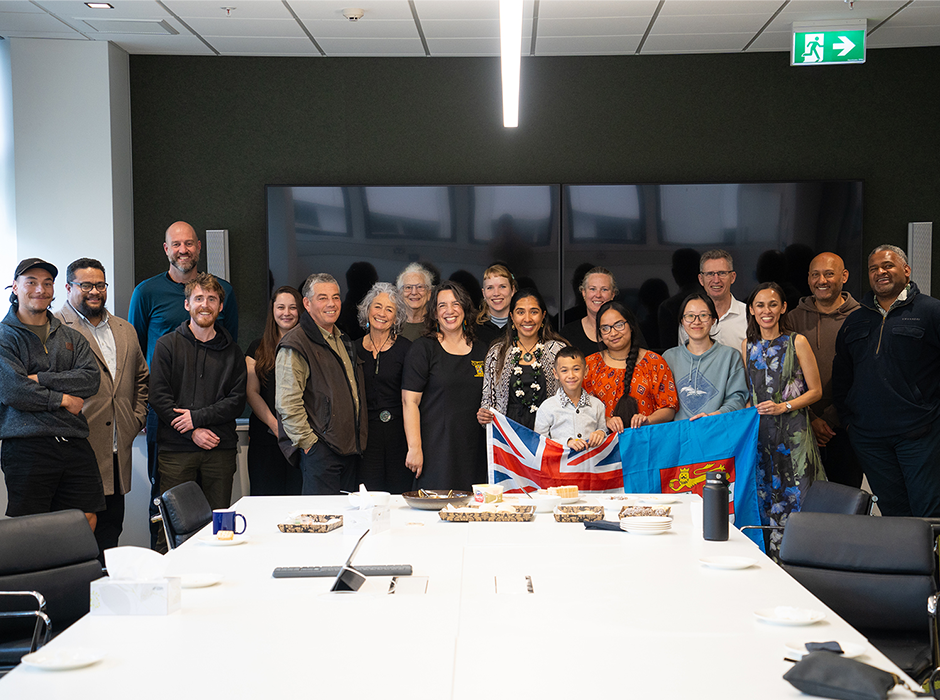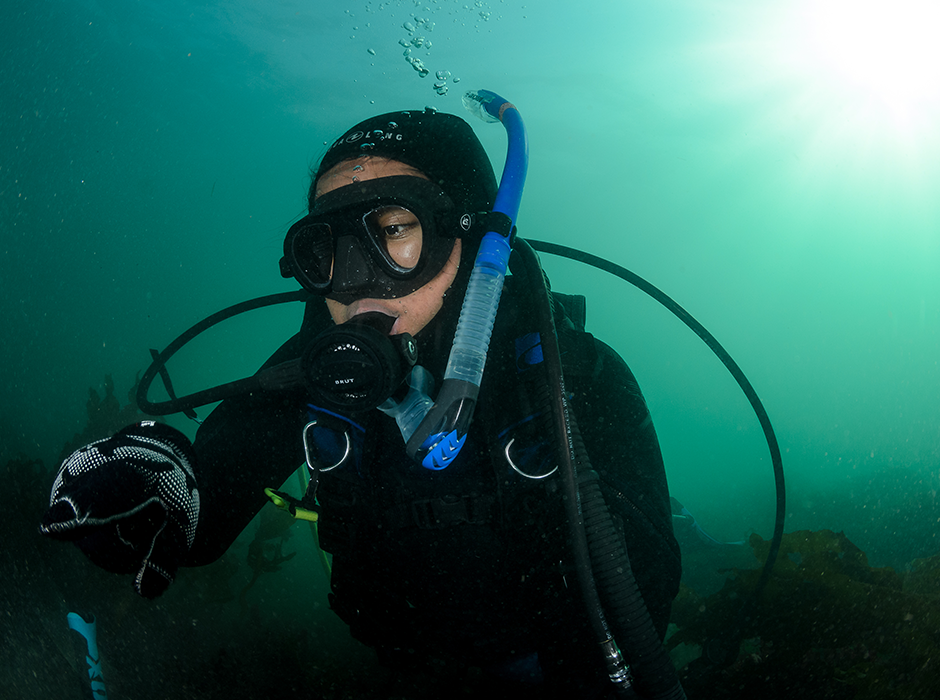
Surrounded by members of her support network and ‘village’, Namrata Chand’s doctorate oral defence is the first community-supported Pacific PhD exam to take place in the Sciences.
During her school years in Fiji, studying marine science was never on Namrata (Nam) Chand’s agenda. Instead, subjects involving commerce drew her attention.
All that changed however when Nam was offered an undergraduate scholarship to study Aquaculture and Fisheries at Otago, and her path to marine science was sealed.
Taking the plunge into marine science created opportunities where she explored a wide range of ecosystems, from the vibrant coral reefs of Fiji to the seaweed-rich waters of Otago Harbour, Fiordland, and Stewart Island. A connection with water - and in particular cold-water plunges for wellbeing - became an integral part of Nam’s life.
At the end of her undergraduate degree, Nam returned to Fiji and was recognised as an Otago 20Twenties recipient for her leadership in working to inspire resilience with local informal settlements vulnerable to the impacts of climate change. Supported with an Otago doctoral scholarship, Nam returned to Dunedin to complete her PhD.
This week, alongside her family who have travelled from Fiji, Nam is graduating with her PhD in Marine Science and is believed to be the first Pacific student to gain a doctorate in the Department. Her oral defence was also the first community-supported Pacific PhD exam to take place in the Sciences.
Guy Frederick caught up with Nam online from Fiji to talk about her research and time at Otago as a Pacific PhD student.
What was your research about?
If I could summarise it in one phrase, it would be ‘there’s no place like home’. I researched a red seaweed called Adamsiella that’s endemic to New Zealand and named in honour of the local botany legend Nancy Adams. The seaweed is unique as it grows in soft sediments, and my research explored the physiology and assemblages of Adamsiella beds in Otago Harbour. The research found that it plays an important ecological role as an ‘ecosystem engineer’ as it creates a supportive habitat for other seaweeds and organisms to live in as their ‘home’. Thus, there is truly no place like home, and there’s a critical need to recognise the role that this endemic seaweed plays in the marine ecosystem for its future conservation.
What was it like learning to scuba dive?
As a Pacific Islander, the thought of plunging into cold waters sent shivers down my sun-loving spine. I learned to scuba dive in Fiji’s warm tropical waters, and ironically my first dive in New Zealand for my PhD was in the middle of winter in chilling nine-degree waters. It was quite an adjustment from diving in Fiji’s clear tropical waters in a t-shirt surrounded by colourful coral reefs to diving here in a thick wetsuit in conditions that felt like blind diving. Thanks to me studying seaweed that lived in mud, the waters I was diving in were dark and murky. One of my deepest understandings from my PhD journey came from adapting and learning to befriend the cold waters.

Nam learned to scuba dive and embrace the cold waters of southern New Zealand for her research on the endemic red seaweed, Adamsiella.
What did you learn during your PhD?
One of the most valuable lessons was that the end product of a PhD is not your thesis, but the holistic development of yourself as a person. The knowledge and skillsets gained during the PhD journey is beyond the academic circle, and the challenges faced along the way have played a huge role in my transformation. The start of my PhD coincided with the COVID-19 pandemic and I also experienced health challenges that impacted my mental cognition. These sorts of challenges helped me realise the importance of a good support system such as people you can count on, and the need to look after my wellbeing. That’s also when my connection to water, and particularly cold-water plunges, helped to restore my mental and physical health and wellbeing. My PhD journey also highlighted the essential role and support of communities that is central to life in the Pacific Islands and are holistically referred to as one’s village.
Describe what your village at Otago looked like?
My journey was supported by a diverse village that evolved over time. The academic core of it included my supervisors and advisors from NIWA. This support branched out to colleagues at the Marine Science Department and wider networks across the University such as Sciences Pacific Support and The Pacific Island Centre teams who provided invaluable cultural support and advocacy. Family and friends were an integral part of my village too, and then, I had the wonderful village of Karitāne where I ended up for the home stretch of my PhD.
My community at Karitāne highlighted the importance of holistic and wellbeing support. My close friend Elizabeth Vanderburg once described the essentials for welcoming someone into a community: “It's as simple as offering a couch, a kitchen, and a dog - the simple things that make a difference”. Elizabeth and her mum Patti were always there to offer a cuppa, read and provide feedback on countless thesis chapters and support my cold water plunges. The essence of a village support came in people’s presence and small actions that made a huge difference, and its people and environment have had a significant impact on my life.
How did your connection with Karitāne begin?
My undergraduate degree introduced me to Karitāne and I also did a student summership research project with Brendan Flack, Tangata Tiaki for Kāti Huirapa. As part of this, I assisted in assessing numbers of important mahinga kai species around Karitāne, such as tuna (eel) and tuaki (cockles). During the final year of my undergraduate, my class also stayed at Puketeraki Marae during a week-long research camp. We learned about the community’s connection to the environment and it helped me realise my love for research and especially the kind that’s tied to serving communities. What resonated was the parallels to how things function in a Pacific Island context. Karitāne has become a special place for me - a community that has welcomed me and transformed how I see the ocean.
How was your PhD community-supported oral defence experience?
I am grateful to the Sciences Pacific Support team for helping make it a reality. I was surrounded by friends, family, and members of both my local and global community either in person or via Zoom from places as far as Fiji and the USA. The youngest attendee was a four-year-old and the most senior supporter was 84. The experience was a surreal and heartful celebration of my PhD journey. It was an uplifting and memorable opportunity to share my research with a community that had played a role in making my PhD dream possible.
What are your plans after graduation?
I’m keen to continue to expand my research interest in ocean and coastal connections and its link to wellbeing. I am especially interested in knowing how individuals and communities establish and maintain connections to new coastal bodies in the face of migration and how these bonds contribute towards their sense of belonging, culture and overall wellbeing. I’d love to engage in the field of science communication and be able to share the results of my research with a broader audience. By making research more accessible and engaging, I hope to inspire meaningful action and dialogue around the importance of coastal waters and its ties to human wellbeing.